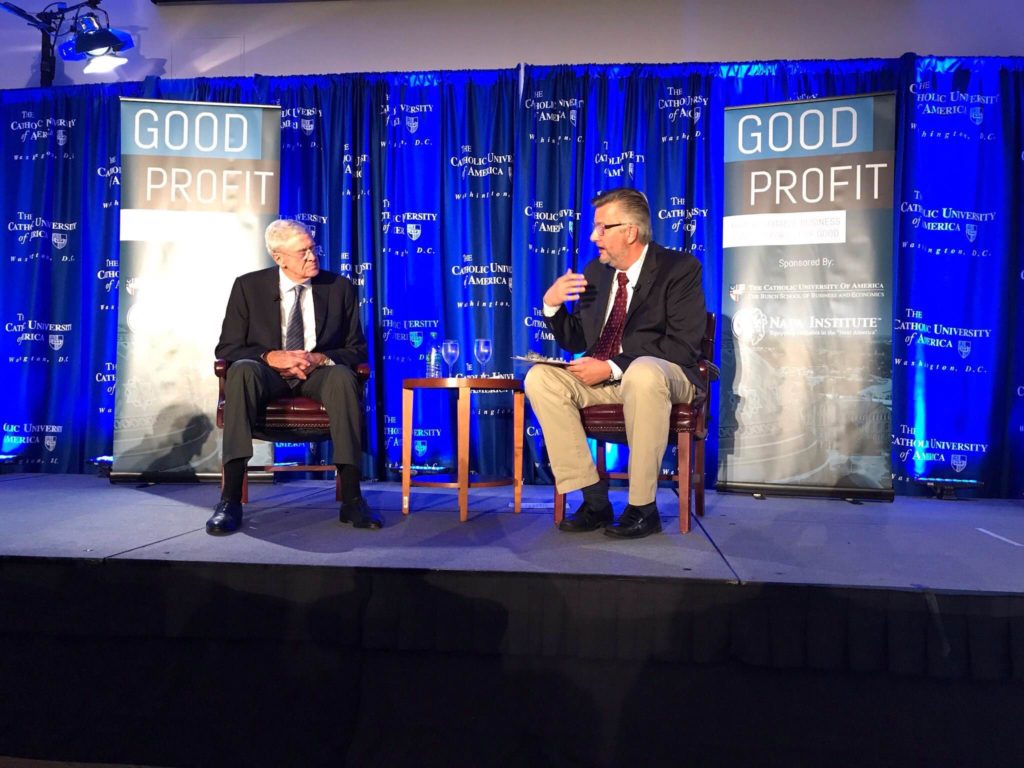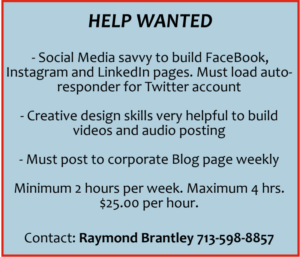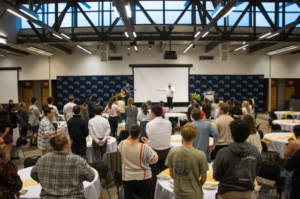Busch School’s Good Profit Conference Brings Charles Koch to Speak at Catholic

By Katie Ward
Only at the Catholic University of America would students witness church leaders and business giants coming together to discuss how to improve society.
The Good Profit: How Profitable Business Can be a Force for Good Conference, held in the Great Rooms in the Pryzbyla Center from October 4th-6th, was attended by over 500 successful businessmen and women, entrepreneurs, young professionals, and students⎯ and billionaire Charles Koch, author of the eponymous book Good Profit and the seventh richest man in the United States.
This conference was the third conference of its type co-hosted by the Napa Institute and the Busch School of Business and Economics. The Napa Institute is dedicated to supporting, educating, and networking Catholics in an increasingly secular America.
Tim Busch and Father Robert Spitzer are both co-founders of the Napa Institute. Fr. Spitzer guided the attendees through the many talks and panel sessions, summarizing each talk after it was presented.
The Busch School was excited for the conference to bring other “spiritual entrepreneurs” to the school to further promote its ideas of ethical business and commitment to social good.
Catholic University Professor Andreas Widmer, a speaker at the conference, summarized the school’s expectations for the conference.
“At least two previous participants were so excited by the depth and freshness of the conversations at this annual conference that they are now faculty here at The Busch School!” Widmer said. “So we expect some people who join us this week will want to collaborate in our mission in some way going forward.”
The Busch School is undergoing construction on a new building that is being advertised as “Harvard on the outside, Google on the inside.” Koch has donated almost $13 million dollars to the new school in the past four years in support of the school’s curriculum, which views business as a “noble vocation” and a “force for good”. The school will be celebrating its fifth anniversary in January 2018, and the new building will hopefully be open the following fall.
Teachers and administrators in the Busch School hoped that the conference would allow students to learn the value of virtue-driven business. Speakers at the three-day conference gave talks on the varying overlaps of Catholic Social Teaching and Koch’s theory of Market-Based Management. Catholic Social Teaching advocates for economies that serve people, not the other way around, according to the United States Conference of Catholic Bishops. Two of its pillars are “dignity of work and rights of workers” and “options for the poor and vulnerable”.
These are similar thoughts to the basic principles of Koch’s Market-Based Management, which aims to improve the world through virtue in business. Koch’s book defined principled entrepreneurship as “maximizing the long-term profitability of its business by creating superior value for customers while consuming fewer resources and always acting lawfully and with integrity.”
Staying true to its goal of combining business with spirituality, the conference offered daily masses, the sacrament of reconciliation, and designated reflection times for the attendees.
“So what’s a nice Catholic university like ours doing discussing profit in the first place?” Widmer joked after the opening remarks, during his talk, “Is Good Profit the Goal of a Company?”
Koch himself was interviewed by Widmer on the second day of the conference, in his segment “What is Good Profit?” He briefly explained how he came to the realization that he could use his inherited company and influence to make a real difference in society, in his business, and in his personal life.
“I internalized Newton’s insight, ‘If I can see further, it is by standing on the shoulders of giants’,” Koch said. “So I said, what I’ve got to do is go find these giants, go find the principles, scientific and social progress, and then figure out how to apply them in my life.”
Koch continued to explain that he believes the largest problem in the country is when people try to hurt each other instead of help each other, and that if business leaders were dedicated to helping others change their lives it would “change the trajectory of the country.”
Koch Industries, the second largest private business in the United States, is a multinational corporation that is involved in the global commodity trading, engineering, real estate, refining, and manufacturing of pipelines, biofuels, consumer products, and technology. Owning a private industry allows Koch and his brother to retain control of the business and how it’s run.
Other speakers included Robert Nardelli, previously the CEO of Chrysler and Home Depot, Claire Huang, a member of the board of directors of Scottrade and previously the Chief Marketing Officer for JP Morgan Chase, and Cardinal Peter Turkson, a key advisor to the Pope on economic and environmental matters.
Widmer summarized the goal of the conference this year. “If participants learn from each other, perhaps have at least some of their set ideas challenged, deepen their understanding of their faith, and have a great few days of fellowship, we will feel the week was a success especially when our students will be present to learn from all of this.”








“Effective labor unions are still by far the most
powerful force in society for the protection of the laborer’s rights and the
improvement of his or her condition. No amount of employer
benevolence, no diffusion of a sympathetic attitude on the part of the
public, no increase of beneficial legislation can adequately supply for the
lack of organization of workers among themselves.” -Monsignor George G. Higgins
Thank you for sending me this as a followup.
Mark Gruenberg
editor
Press Associates Union News Service